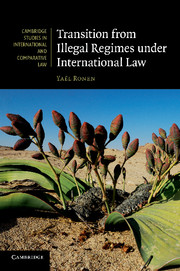Book contents
- Frontmatter
- Contents
- Abbreviations
- Acknowledgements
- Foreword
- Table of treaties
- Table of case law
- Table of UN documents
- Table of domestic legislation and similar acts
- Table of documents of intergovernmental organizations
- 1 Introduction
- 2 The case studies
- 3 The obligation of non-recognition
- 4 The effect of transition on treaty relations of the territory
- 5 The effect of transition on the domestic law of the territory
- 6 The effect of transition on settlers implanted by illegal regimes
- 7 The effect of transition on land titles
- 8 Conclusions: Non-recognition and transition
- Selected bibliography
- Index
- References
4 - The effect of transition on treaty relations of the territory
Published online by Cambridge University Press: 05 July 2011
- Frontmatter
- Contents
- Abbreviations
- Acknowledgements
- Foreword
- Table of treaties
- Table of case law
- Table of UN documents
- Table of domestic legislation and similar acts
- Table of documents of intergovernmental organizations
- 1 Introduction
- 2 The case studies
- 3 The obligation of non-recognition
- 4 The effect of transition on treaty relations of the territory
- 5 The effect of transition on the domestic law of the territory
- 6 The effect of transition on settlers implanted by illegal regimes
- 7 The effect of transition on land titles
- 8 Conclusions: Non-recognition and transition
- Selected bibliography
- Index
- References
Summary
Introduction
Two main issues arise in regard to the effect of the territorial regime's illegality and its non-recognition on the treaty relations of the territory. One is the status of treaty relations that existed prior to the illegal regime: Do they survive the illegal regime and bind the returning sovereign, or, if the post-transition regime is a new state, can it exercise the option of succession to these treaties? Another issue is the status of treaties purportedly concluded by the illegal regime on behalf of the territory: can they be available to the post-transition regime if it wishes to ‘succeed’ to them? Are there any circumstances in which they may be binding upon the post-transition regime? These questions are pertinent to transition from both putative states and putative annexations, although treaties are more likely to be purportedly concluded with governments of existing states regarding illegally annexed territory, than with non-state actors.
In the international sphere, the post-transition regime is constrained by the consensual nature of inter-state relations. It is therefore not in a position to give unilateral effect to invalid acts or to terminate valid acts preceding the illegal regime, except where the law of treaties itself permits unilateral action. Thus, if a treaty purportedly entered into by the illegal regime on behalf of the territory was treated as a nullity by other parties, the post-transition regime cannot validate the treaty with respect to its territory without the consent of the other parties.
- Type
- Chapter
- Information
- Transition from Illegal Regimes under International Law , pp. 103 - 158Publisher: Cambridge University PressPrint publication year: 2011

